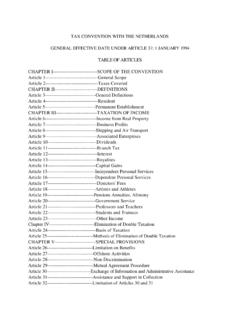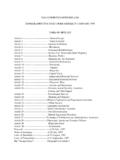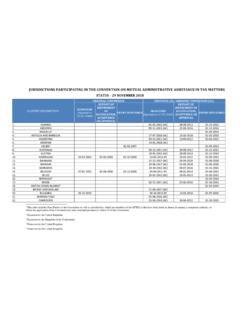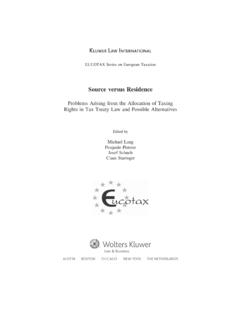Transcription of ISSUES RELATED TO ARTICLE 17 OF THE MODEL …
1 ISSUES RELATED TO ARTICLE 17 OF THE MODEL TAX convention Adopted by the OECD Committee on Fiscal Affairs on 26 June 2014 1 TABLE OF CONTENTS INTRODUCTION .. 2 PART 1 COMMENTS NOT SPECIFICALLY RELATED TO THE PROPOSALS .. 2 1. Suggestion that ARTICLE 17 should be deleted .. 2 2. Suggestion that ARTICLE 17 should be substantially amended .. 3 3. Suggestion that ARTICLE 17 should not apply to entertainers who are employed .. 5 4. Comments according to which many entertainers earn small amounts of income .. 5 5. Suggestion that treaties do not eliminate double taxation if States do not agree .. 5 6. Special ISSUES for theatre producers .. 5 7. Other comments not specifically RELATED to the proposals included in the discussion draft .. 6 PART 2 PROPOSALS INCLUDED IN THE APRIL 2010 DISCUSSION DRAFT .. 7 1. What is an entertainer or sportsperson? .. 7 2. Application of ARTICLE 17 to race prizes.
2 8 3. What are the personal activities of an entertainer or sportsperson as such? .. 9 Activities of models and public speakers .. 9 Preparation and training activities .. 10 Activities of producers and promoters and need to avoid double taxation .. 11 Alternative provision for the members of a sports team .. 13 4. Source and allocation rules for activities performed in various countries .. 13 5. Special categories of payments .. 15 Merchandising payments and prizes and awards .. 15 Broadcasting payments .. 17 Payments for image rights .. 18 ANNEX - CONSOLIDATED VERSION OF THE COMMENTARY ON ARTICLE 17 .. 20 2 ISSUES RELATED TO ARTICLE 17 OF THE OECD MODEL TAX convention INTRODUCTION 1. Under ARTICLE 17 of the OECD MODEL Tax convention , the State in which the activities of a non-resident entertainer or sportsperson are performed is allowed to tax the income derived from these activities.
3 This regime differs from that applicable to the income derived from other types of activities making it necessary to determine questions such as what is an entertainer or sportsperson, what are the personal activities of an entertainer or sportsperson acting as such and what are the source and allocation rules for activities performed in various countries. 2. On 23 April 2010, the OECD Committee on Fiscal Affairs released a discussion draft1 dealing with these and other questions RELATED to the application of ARTICLE 17 that was prepared by a subgroup of Working Party 1 on Tax Conventions and RELATED Questions. That public discussion draft included proposals for additions and changes to the Commentary on the OECD MODEL Tax convention resulting from the work of that subgroup. 3. Comments on the discussion draft were received from 11 organisations and individuals.
4 The Committee, through its Working Party 1, reviewed the proposals included in the discussion draft in light of these comments. This report is the result of that subsequent work. 4. A significant part of the comments received did not relate directly to the proposals included in the discussion draft; these comments are dealt with in Part 1 of the report. Part 2 of the report includes the specific proposals for changes to the Commentary that were included in the discussion draft, as amended in light of the comments received, together with a summary of the relevant comments and the response of the Committee. Annex 1 includes a consolidated version of ARTICLE 17 and its Commentary that includes all the changes proposed in this report. PART 1 COMMENTS NOT SPECIFICALLY RELATED TO THE PROPOSALS 1. Suggestion that ARTICLE 17 should be deleted 5. The Committee first discussed the suggestion, included in some of the comments received, that ARTICLE 17 should be deleted and that no specific rule should therefore apply to income derived from the activities of entertainers and sportspersons.
5 The Delegate for the Netherlands explained the reasons why his country had decided to exempt foreign sportspersons from source taxation The vast majority of delegates, however, supported the view that ARTICLE 17 should be kept. During the discussion, it was noted that residence taxation should not be assumed given the difficulties of obtaining the relevant information, 1 See ,3343,en_2649_33747_45056800_1_1_1_1, 3 that ARTICLE 17 allows taxation of a number of high-income earners who can easily move their residence to low-tax jurisdictions and that source taxation of the income covered by the ARTICLE can be administered relatively easily. 2. Suggestion that ARTICLE 17 should be substantially amended 6. The Committee also discussed a number of comments that included proposals for substantial changes to ARTICLE 17.
6 The interventions focussed on the suggestion to include a de minimis rule under which low-income earners would be exempt from the application of ARTICLE 17. It was noted that such a rule is included in many treaties concluded by the United 7. The Committee discussed the various features that such a de minimis rule should have and reached the following conclusions: Whilst various options are possible with respect to the determination of the threshold amount under which ARTICLE 17 would not apply, the rule should ideally avoid the reference to the currency of one of the two States and should provide an amount that remains relatively constant in value regardless of currency fluctuations. It was therefore decided to refer to the IMF Special Drawing Rights (SDRs), which are based on a basket of currencies revised periodically (see ) and are easily converted in most convertible currencies.
7 For ease of administration, the approach chosen should provide a constant amount for each taxation year and that amount should be known at the beginning of the year. For this reason, it was decided that the rule would indicate that the agreed amount should be converted in the currency of each Contracting State at the beginning of each of that State s taxation years. It was also agreed that the threshold amount would have to be updated periodically. The rule would not prevent Contracting States from collecting tax at the time the relevant income was earned and refunding it after the end of the year once it is established that the threshold amount has not been exceeded. The de minimis exception should only apply with respect to paragraph 1. Applying the rule with respect to entities covered by paragraph 2 would likely result in a fragmentation of contracts among many RELATED entities in order to multiply the benefit of that exce ption.
8 The rule should only restrict the additional taxing right granted by ARTICLE 17 and should not affect the source taxing rights otherwise available under Articles 7 and 15. It should therefore not prevent taxation to the extent that the entertainer has a permanent establishment in the 2 The provision included in the 2006 US MODEL Treaty reads as follows: 1. Income derived by a resident of a Contracting State as an entertainer, such as a theater, motion picture, radio, or television artiste, or a musician, or as a sportsman, from his personal activities as such exercised in the other Contracting State, which income would be exempt from tax in that other Contracting State under the provisions of Articles 7 (Business Profits) and 14 (Income from Employment) may be taxed in that other State, except where the amount of the gross receipts derived by such entertainer or sportsman, including expenses reimbursed to him or borne on his behalf, from such activities does not exceed twenty thousand United States dollars ($20,000) or its equivalent in ---------- for the taxable year of the payment.
9 4 State of source or is present in the other State for more than 183 days (or is employed by an employer who is a resident of that State or has a permanent establishment in that State). 8. After discussion, the Committee agreed that the Commentary on ARTICLE 17 should include the following alternative provision (and explanations thereon) that countries wishing to do so could include in their bilateral treaties: Add the following paragraphs to to the Commentary on ARTICLE 17: Some States may also consider that it would be inappropriate to apply ARTICLE 17 to a non-resident entertainer sportsperson who would not otherwise be taxable in a Contracting State ( under the provisions of ARTICLE 7 or 15) and who, during a given taxation year, derives only low amounts of income from activities performed in that State. States wishing to exclude such situations from the application of ARTICLE 17 may do so by using an alternative version of paragraph 1 drafted along the following lines.
10 Notwithstanding the provisions of Articles 7 and 15, income derived by a resident of a Contracting State as an entertainer, such as a theatre, motion picture, radio, or television artiste, or a musician, or as a sportsperson, from his personal activities as such exercised in the other Contracting State, may be taxed in that other State, except where the gross amount of such income derived by that resident from these activities exercised during a taxation year of the other Contracting State does not exceed an amount equivalent to [15 000 IMF Special Drawing Rights] expressed in the currency of that other State at the beginning of that taxation year or any other amount agreed to by the competent authorities before, and with respect to, that taxation year. The amount referred to in the above provision is purely illustrative.
















